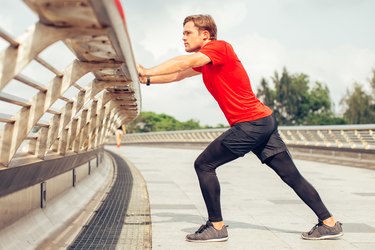
Your knees are important joints — think about how much they do in essentially every single lower-body movement you do, like standing up out of a chair, walking, cycling and squatting in the gym. Tightness or pain in the back of the knee can limit your ability to do all of those things (and more) comfortably.
There are a handful of things that can contribute to back-of-knee tightness (scroll down for the list). And, fortunately, there are also several stretches for the back of the knee that can help relieve tightness — no matter which muscle or tendon is causing it, says Sarah Gallagher, PT, DPT, a physical therapist and owner of South Valley Physical Therapy in Denver.
Video of the Day
Video of the Day
Try These 6 Stretches for the Back of the Knee
Looking to loosen the muscles behind your knee? Add these knee flexibility exercises into your routine. Try to stretch the area at least once every day. You can do these multiple times a day, though, if you feel like you need it.
Gallagher recommends doing these knee stretches when your muscles are already warm, like after your regular workout or any other physical activity like walking around your house. You can also do them at other times when you feel like you just need a good stretch, but it might just take a little longer for them to loosen up.
For optimal results, she suggests holding each stretch for 1 minute, repeating each stretch 3 times.
1. Seated Figure-4 Hamstrings Stretch
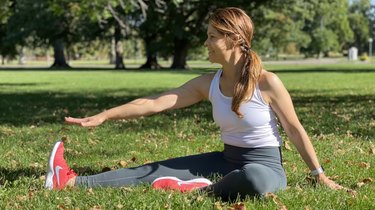
- Sit on the ground with one leg extended in front of you and the other bent into a figure four with the foot resting against your inner thigh.
- Hinge forward with a straight back over the straight leg.
- Hold, then repeat on the other leg.
The figure-4 stretch is a great way to address hamstring tightness behind the knee.
"Stretching each leg separately addresses each one at its level of tightness," Gallagher says. Chances are, one might be tighter than the other, and if you stretch both legs at once you'll only sufficiently stretch the tighter one.
2. Chair Hamstrings Stretch
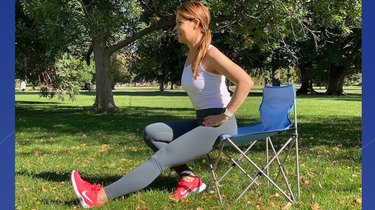
- Sit tall on the edge of a chair and extend one leg out in front of you. Bend your other knee and place your foot flat on the floor.
- Hinge forward with a straight back over your straight leg.
- Hold, then repeat on the other leg.
Gallagher suggests this gentle knee stretch to people who spend a long time sitting at a desk because it lets you loosen the hamstring muscles behind the knee without requiring you to even get up. "You can do this desk stretch while you're working and get a great benefit," she says.
3. Heel Hang
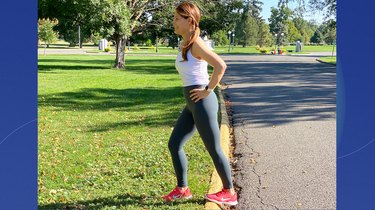
- Stand in a staggered stance with the toes of your back foot on the edge of a curb or step.
- Lightly bend your front knee and keep your back leg straight as you press back into your back leg so that your heel hangs off the curb or step.
- Hold, then repeat on the other leg.
This stretch will help loosen up the gastrocnemius, and also makes for a good soleus muscle stretch.
4. Standing Calf Stretch With Straight Knee
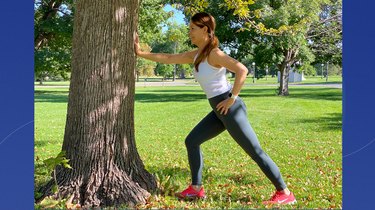
- Stand facing a wall with staggered feet. Place your palms on the wall at shoulder height.
- Bend your front knee and slowly lean toward the wall while keeping the heel of your back leg on the floor.
- Hold, then repeat on the other leg.
By keeping your knee straight in this stretch, you focus on the gastrocnemius, which crosses behind the knee.
5. Standing Calf Stretch With Bent Knee
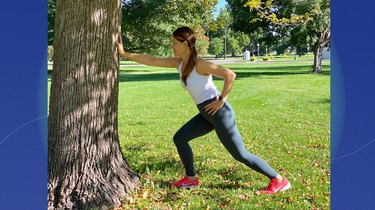
- Stand facing a wall with staggered feet. Place your palms on the wall at shoulder height.
- Bend your front knee and slowly lean toward the wall while keeping the heel of your back leg on the floor.
- Bend your back knee a bit to change the focus of the stretch to the soleus muscle.
- Hold, then repeat on the other leg.
By bending your knee, you turn this move into a fantastic soleus stretch, Gallagher says. Your soleus is a calf muscle that connects close to the knee but doesn't actually cross the joint.
Play around with this stretch. You can even alternate back and forth between a straight and bent knee.
6. Standing Hamstrings Stretch
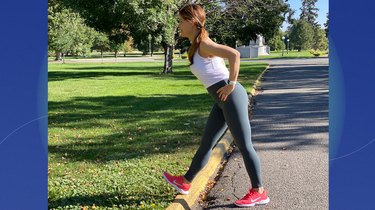
- Stand in a staggered stance with the heel of your front foot on the edge of a curb or step.
- Keeping both legs straight, press into your front heel and hinge forward over your leg until you feel a deep stretch down your hamstrings.
- Hold, then repeat on the other leg.
This is similar to the chair hamstrings stretch. But because you do it from a standing position, you can get a wider range of motion and a deeper stretch.
3 Reasons Why the Muscles Behind Your Knee Are Tight
When people describe tightness behind the knee, it's likely the result of a tight muscle, Gallagher says.
If you're looking to blame a specific muscle for your tight knees, there are two likely culprits: the hamstring muscles and the calf muscles.
The hamstring muscles — the semitendinosus, semimembranosus and biceps femoris — are behind the knee and play a key role in hip extension (straightening) and knee flexion (bending), according to StatPearls. They also help stabilize the knee.
While both of the calf muscles, the soleus and gastrocnemius, can contribute to knee tightness, the gastrocnemius crosses behind the knee and is the most likely of the calf muscles to cause tightness in the back of the knee. The gastroc is in charge of flexing and stabilizing the knee. Both the gastroc and soleus are involved in plantar flexion — aka, pointing your toes.
If you have a tight hamstring behind your knee or a tight calf muscle, chances are, you'll feel some discomfort in the back of the knee. There are also tendons and other soft tissues behind the knee, like the posterior cruciate ligament, which can tighten up as well.
A lot of things can cause these muscles and tendons in the back of the knee to feel tight, resulting in that sensation of tightness behind the knee: your activity level, the type of exercises you do and even how you sit throughout the day can contribute.
1. Your Workouts Involve a Lot of Knee Flexion
"People who do exercises like running and cycling will probably be more prone to knee tightness because there is a lot of bending the knee in those activities, whereas someone who does yoga will not be as prone because this type of exercise inherently involves a lot of straightening of the knee," Gallagher says.
2. You Sit a Lot With Bent Knees
It only makes matters worse when you do those sort of bent-knee exercises and then proceed to plop yourself in a chair for the rest of the day.
"People will get their exercise in and then go sit for eight hours and then stand up and feel like they can't straighten their leg," Gallagher says.
To prevent this back-of-knee tightness, she often recommends simply straightening your legs one at a time every 20 minutes or so. "People tend to bend or cross their legs but don't straighten the knees."
3. You Have Hunched Posture
Posture also plays a role here. "If you slump down in your chair, that shortens the hamstrings, too," Gallgher says. If you sit that way every now and then, it shouldn't cause any issues. But over time, it can really build up. "When you spend a third of your time like this, that's when it can become trouble."
The Effects of Back-of-Knee Tightness
Over time, if you have chronically short hamstrings or calves, you could develop other issues, like tendonitis in the hamstring or achilles or lower back pain, she says.
"When the hamstrings are tight, it puts a lot more strain on the lower back muscles." Tightness in the back of the knee, and any lack of mobility, can also change how you move when you walk, run and cycle, which can make you more prone to injury, she adds.
The Benefits of Back-of-the-Knee Stretches
Stretching (as well as knee-strengthening exercises) can help counteract those possible effects of tightness. The stretches above loosen your hamstrings and calves, which minimizes strain on your lower back, promotes healthy movement patterns and wards off tendonitis and pain.
When to Talk to a Doctor
Tightness in the back of the knee can also be kind of painful. Doing these stretches for knee tightness might help relieve that pain, too, if it's minor and actually due to the tightness.
But if your knee pain is ever sharp, or if it gets worse over time, stop what you're doing. These are signs you might have an actual injury, and that needs to be addressed by a doctor or physical therapist.
Was this article helpful?
150 Characters Max
0/150
Thank you for sharing!
Thank you for your feedback!